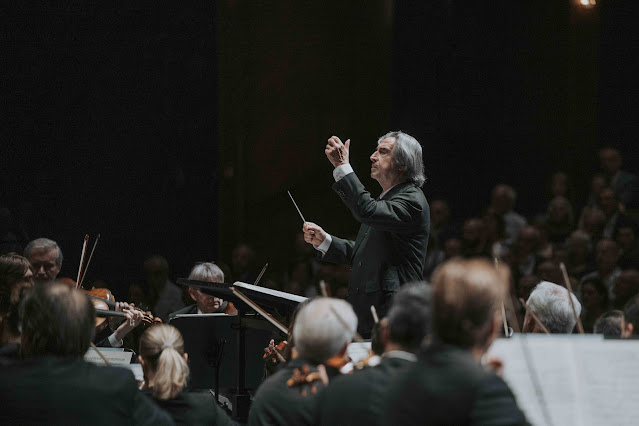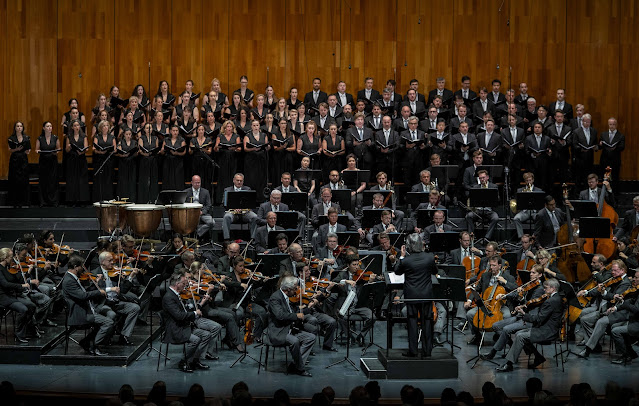 |
| Vienna Philharmonic Orchestra, Riccardo Muti – Grosses Festspielhaus, Salzburg Festival (Photo: SF/Marco Borelli) |
Schubert: Symphony No. 4 ‘Tragic’, Bruckner: Mass in F minor; Ying Fang, Wiebke Lehmkuhl, Pavol Breslik, William Thomas, Konzertvereinignung Wiener Staatopenchor, Wiener Philharmoniker, Riccardo Muti; Salzburg Festival at Grosses Festspielhaus, Salzburg
Reviewed 15 August 2025
Under veteran conductor Riccardo Muti’s deft direction the Vienna Philharmonic were on form in large scale symphonic accounts of a youthful Schubert symphony and one of Bruckner’s great masses
For the Vienna Philharmonic‘s concert at the Salzburg Festival on the morning of 15 August (the Feast of the Assumption) they were conducted by the apparently ageless (he is 84) Riccardo Muti in Schubert’s Symphony No. 4 in C minor ‘Tragic’ and Bruckner’s Mass in F minor with soloists Ying Fang, Wiebke Lehmkuhl, Pavol Breslik, William Thomas, and the Concert Association of the Vienna State Opera Chorus.
There is some 50 years between the two works. Schubert’s symphony was written in 1816 (the composer was a mere 19) for a good amateur orchestra yet not highly regarded by the composer and apparently unperformed until ten years after his death. Bruckner’s mass was written in 1867/68 for Linz but the conductor found the mass too long and unsingable and it had to wait until 1872 for its premiere. Both are works probably written for relatively compact forces yet both have what we might term symphonic aspirations and Riccardo Muti’s large-scale approach in both reaped dividends.
We had a very traditional line-up for the Schubert with a large body of strings and double woodwind, the balance thus favouring the strings but when the players are those of the Vienna Philharmonic, who is complaining. This was not a small-scale account of the work yet the sound never felt artificially inflated.
We began relatively intimately, restrained yet rich, taking you on a journey to the far perkier Allegro vivace. This was engaging yet with fierce detail, with a lively bounce yet serious and intent, creating a performance that was alive and urgent, with flashes of more tragic motifs in the development.
The Andante began gracefully yet intimate with the benefit of fine-grained string tone. There were brief touches of drama and it was fascinating to hear Schubert bringing in moments of engaging counterpoint. The Menuetto was most definitely a country dance, robust rhythms to the fore, yet with a delightful swing to the trio. The Allegro finale was engaging, yet with a sense of urgency and, perhaps surprisingly, anxiety. The middle section at moments of urgency yet there was also a Rossini-like insouciance.
For Bruckner’s mass the chorus was the concert arm of the Vienna State Opera Chorus with the stage full of a healthy number of singers. Muti’s unashamedly symphonic approach to this music brought out Bruckner’s transcendent sense of scale. Whatever Bruckner’s original intentions were, the chorus sound was that we might expect in the Te Deum. Bruckner’s mass settings were influenced by the Cecilian movement with its emphasis on directness and clarity of words in musical settings. This chimed in with Bruckner’s symphonic preferences and here, for much of the work, the chorus sang in homophonic blocks of sound enlivened by orchestral textures. That said, the chorus’ diction was not quite what it could have been.
There was a link with Schubert in that Bruckner’s use of his soloists was very much like a semi-chorus rather as Schubert did in his masses. Here, with the large-scale of the chorus Muti brought out the contrasts of scale between chorus and soloists.
The Kyrie was sober, the choral phrases unfolding in a way that was leisurely yet with an underlying fervency. The Gloria began vividly vigorous, the choir’s almost trenchant lines enlivened by orchestral counterpoint. Tender solos from soprano Ying Fang and mezzo-soprano Wiebke Lehmkuhl only served to emphasise the power of the choral-orchestral contributions. This dichotomy continued through the movement till Bruckner brought things to a triumphant, fugal conclusion.
The opening sections of the Credo were notable for the vigour of the choral contributions, the music trenchantly striding across the orchestra, the singers confident in affirming their message. There was a moment of pure aural magic as Muti and Bruckner used the soli as an echo chorus at the words ‘Deum de Deo, lumen de lumine’. When the confident proclamation halted, Pavel Breslik’s radiant tenor made ‘Et incarnatus’ an intimate solo intertwining with the solo violin. The darkness of the male chorus at ‘et homo factus est’ led to some highly welcome chromatic chorus writing, echoed by William Thomas’ intense bass solo. Vivid vigour and choral affirmation returned, with Muti creating a positively symphonic feel to the textures, though there were moments of mystery and the whole of the concluding section of the Credo could be summed up by the phrase ‘triumph and mystery’.
The lightly seductive orchestral textures at the beginning of the Sanctus complemented the more direct choral statements, leading to a joyful Hosanna featuring familiar changes of scale between the soli and the full chorus.
As someone familiar mainly with Bruckner’s sacred motets and for whom his symphonies can seem somewhat long winded in their procedures, Bruckner’s reluctance to move on or reach a conclusion in this music made you understand why the mass might seem too long. Certainly, a Benedictus of this length would be liturgically inappropriate nowadays and probably was so in Bruckner’s day. Yet clearly, the movement was felt by Bruckner to need this amplitude to deal with the sacred. Certainly it moved from the intimate and tender to something more intense with some quasi-operatic singing from the soloists.
The Agnus Dei was surprisingly sober and intense with some lovely contrasts in the repeated ‘Miserere nobis’ from the soli, until the final refrain when richer textures led to a symphonic development that returned to a sense of the transcendent.
The blog is free, but I’d be delighted if you were to show your appreciation by buying me a coffee.
Elsewhere on this blog
- Salzburg Festival – Strange & intriguing: Dmitri Tcherniakov directs his first Baroque opera with Handel’s Giulio Cesare – opera review
- Going where no other company has dared: Green Opera gives the stage premiere of Joubert’s Jane Eyre at Grimeborn Festival – opera review
- New challenge & new repertoire: trumpeter Matilda Lloyd her new disc, Fantasia, pairing contemporary pieces with Baroque – interview
- I Shall Hear In Heaven: Tama Matheson impressively incarnates Beethoven with music alongside the spoken word – music theatre review
- BBC Proms: Classics, bon-bons & an engagingly fresh account of a masterpiece, Nil Venditti conducts BBC NOW – concert review
- Bayreuth Festival: Thorliefur Örn Arnarsson’s interpretation of Tristan und Isolde is a well-planned and thoughtful affair – opera review
- All-consuming: Kateřina Kněžíková’s account of the title role lights up Damiano Michieletto’s overly conceptual production of Janáček’s Káťa Kabanová at Glyndebourne – opera review
- BBC Proms – Arvo Pärt at 90: Estonian Philharmonic Chamber Choir, Tõnu Kaljuste – concert review
- Baltic Tides: piano music by two important Baltic pianist composers, Lūcija Garūta & Ester Mägi makes for a marvellous, compelling disc – record review
- Frederick and his sister: music for Postsdam and Bayreuth created for Frederick the Great and Wilhelmine of Bayreuth – record review
- Home











